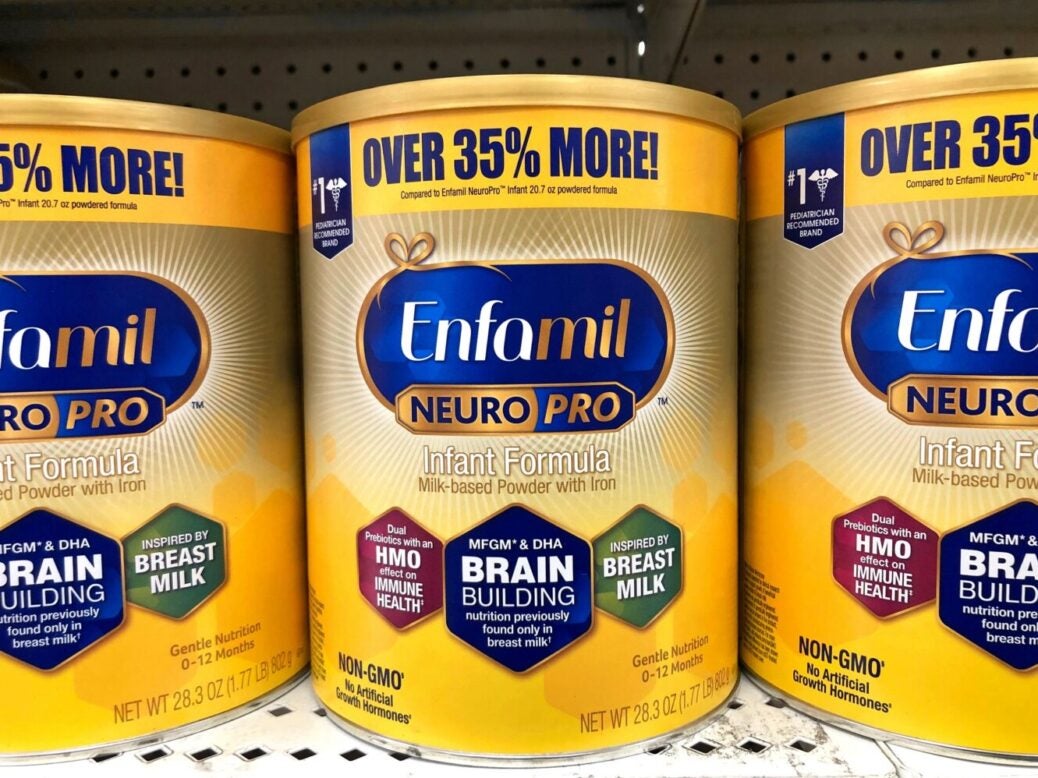Reckitt Benckiser ‘may shelve plan to sell infant-nutrition unit’
<img width="1038" height="778" src="https://www.just-food.com/wp-content/uploads/sites/28/2022/04/shutterstock_1833073897-e1651146158963-1038x778.jpg" class="attachment-4x3-large-crop size-4x3-large-crop wp-post-image" alt="Enfamil brand infant formula on sale in Alameda, California, 13 October 2020. Owned by Reckitt Benckiser" loading="lazy" sizes="(max-width: 1407px) 1407px, (max-width: 335px) 335px, (max-width: 705px) 705px, (max-width: 335px) 335px, (max-width: 689px) 689px, (max-width: 336px) 336px, (max-width: 210px) 210px, (max-width: 101px) 101px, (max-width: 1024px) 1024px, (max-width: 101px) 101px, (max-width: 397px) 397px, (max-width: 464px) 464px, (max-width: 797px) 797px, (max-width: 960px) 960px, (max-width: 314px) 314px, (max-width: 464px) 464px, (max-width: 735px) 735px, (max-width: 1038px) 1038px"/>
UK consumer goods major Reckitt Benckiser is reportedly considering postponing plans to sell its infant-formula unit.
News agency Bloomberg, quoting unnamed sources familiar with the situation, said the sale, reputedly worth US$7bn, has fallen victim to “chaos in the industry and worsening financing markets”.
The company reportedly kicked off plans to sell its remaining businesses in infant formula in April and was said to be working with advisers on moves to sell the assets, which include the Enfamil brand. A number of private-equity firms, including Clayton Dubilier & Rice, were linked with a possible acquisition.
A sale would mark Reckitt’s exit from infant formula five years after buying US manufacturer Mead Johnson. Last year, the company sold its infant-formula operations in China to local investment firm Primavera Capital Group. Reckitt Benckiser kept an 8% stake in the business.
However, last month it was reported that potential buyers had been spooked by a US shortage of infant-nutrition products caused by the closure of an Abbott Laboratories plant following a salmonella scare.
Ironically, Reckitt Benckiser is one of the companies that has increased the production of its products to help keep supermarket shelves stocked.
But, according to Bloomberg’s report, talks between the London-listed company and potential acquirers have stalled in recent weeks.
Aside from the baby-formula crisis, the media outlet cited disagreement over valuation and a lack of available funding for reasons no deal has been sealed.
The structure of the sector is also coming under increased scrutiny by regulators, keen to ensure that shortages do not occur in the future.
The report said Reckitt Benckiser has not yet made a final decision on whether to formally pull the sale.
Just Food has asked Reckitt Benckiser to comment on the Bloomberg story.
Just Food analysis: Why there’s no single formula to fix US infant-milk market
!function(f,b,e,v,n,t,s) if(f.fbq)return;n=f.fbq=function()n.callMethod? n.callMethod.apply(n,arguments):n.queue.push(arguments); if(!f._fbq)f._fbq=n;n.push=n;n.loaded=!0;n.version='2.0'; n.queue=[];t=b.createElement(e);t.async=!0; t.src=v;s=b.getElementsByTagName(e)[0]; s.parentNode.insertBefore(t,s)(window, document,'script', 'https://connect.facebook.net/en_US/fbevents.js'); fbq('init', '501151668227761'); fbq('track', 'PageView');



:quality(70)/cloudfront-us-east-1.images.arcpublishing.com/tronc/WZGIWSRHQNAZ5B7LAEQTNUHSSI.JPG)